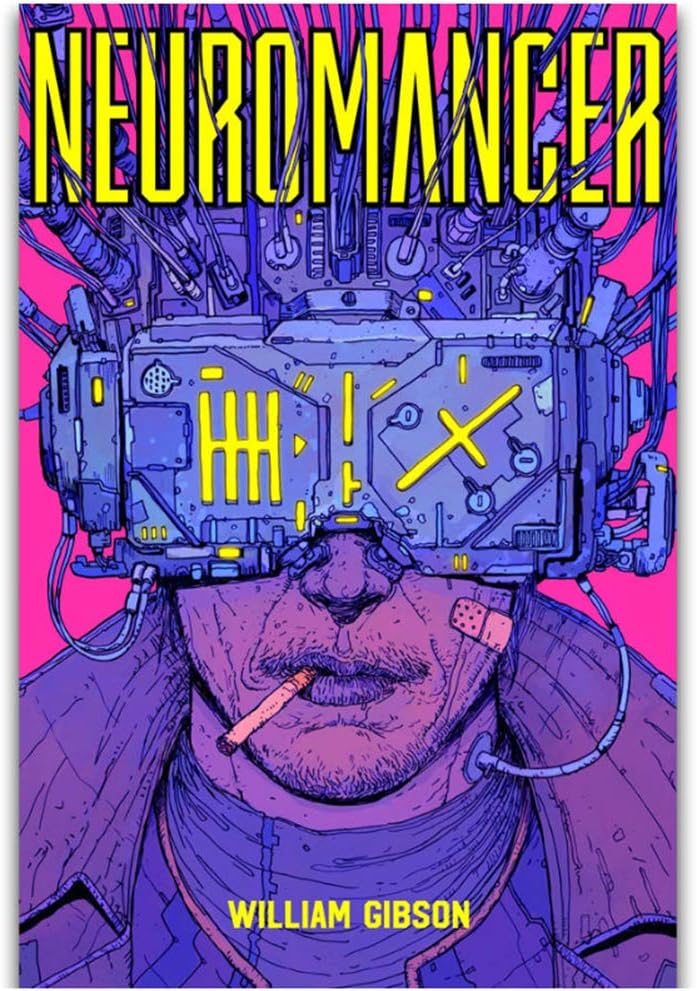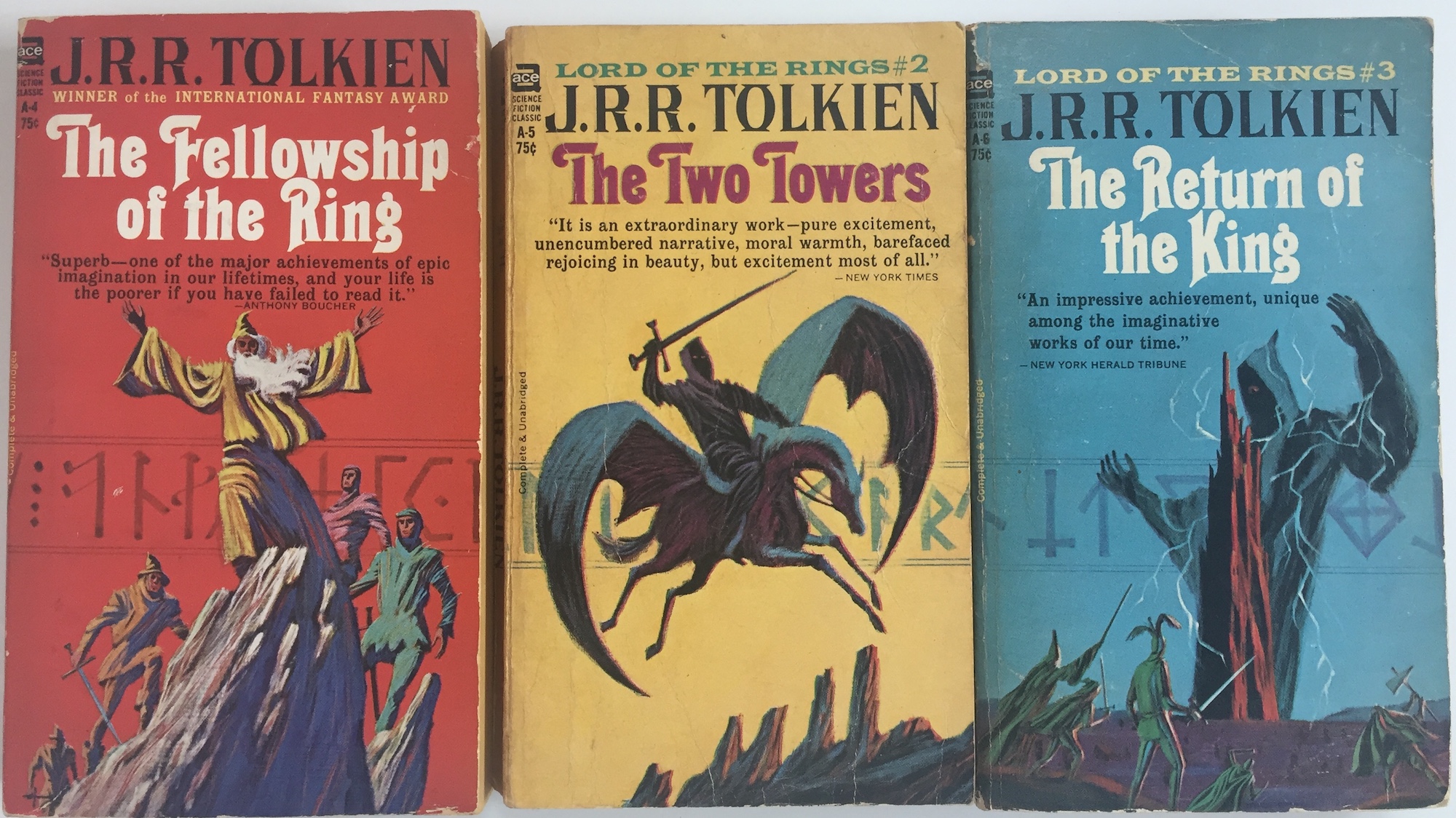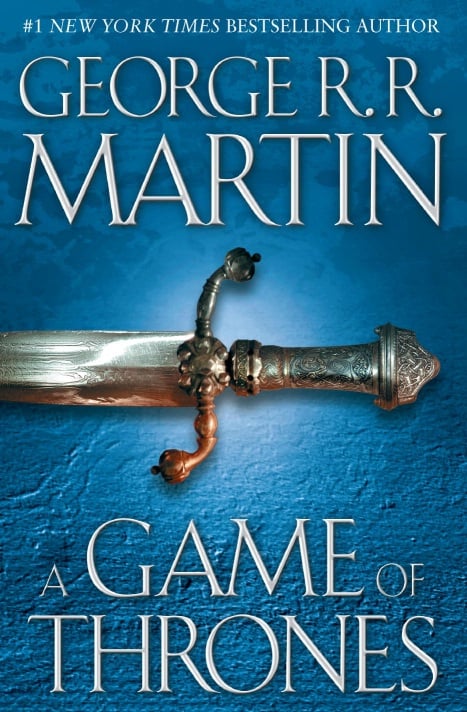I was wandering around The Tattered Cover in downtown Denver recently with several friends and one of them made their way to the science fiction and fantasy section I was perusing. He picked up a few books and stumbled across more than a few that I had read. I held back initially from giving him my opinion and instead tried to stay focused on finding something new for myself to read while I waited for “Project Hail Mary” by Andy Weir to release the following week.

I’m fairly proud of the fact that I maintained silence for about 3 minutes, surreptitiously sneaking glances his direction, peaking at what he pulled off the shelf from the corner of my eye. But when he passed “Red Rising” by Pierce Brown without a second glance I verbally threw up all over him and the other 4-5 individuals quietly making their way through the sci-fi/fantasy section.
It turned out that my friend had a bad experience with fantasy and had mostly given up on the genre years ago. And I realized that similar to pinball, making sure someone starts off on the right book can be a critical part of how they view an entire genre of literature going forward.
And that requires thinking beyond all of my favorites. It means thinking about what is easy to read, what has a solid easy-to-understand plot and memorable characters or perhaps an idea that’s so mind blowing it keeps the reader engaged. Here’s my attempt to give people who may or may not be thinking about diving into a genre of literature I found and made my personal happy-space in the mid-90s a try.
ease your way into the genre, don’t ALWAYS jump to the big names right away
Does it make sense to start the guts of an article with an opposing series of arguments to the article’s theme? In this case, I think it’s helpful because science fiction and fantasy are all the rage right now and chances are you’ve heard of these big time players in the genre:
- Neuromancer (William Gibson)
- The Wheel of Time (Robert Jordan)
- Lord of the Rings (Tolkien)
- Game of Thrones (George RR Martin)
- Dune (Frank Herbert)
And these are just a few of the popular series/books in a genre that has more ridiculously popular books than you could literally shake a stick at in under a minute. And my guess is anyone who is familiar with the genre has a completely different list of books that come to mind first that represents what has been truly successful. And that’s great! They’re likely all amazing books regardless of whether or not they’re mentioned in this article. But each of the books from the list above represent books I would NEVER recommend to a first time science-fiction/fantasy reader and here’s why:
Nueromancer
(William Gibson)
—Difficult to Understand—

This is an amazing book, truly wonderful and set the standard by which the genre of cyberpunk books are measured. But man is it hard to read. William Gibson doesn’t really introduce the technologies people live with. The reader is just thrown into this world and is expected to figure it all out on the fly. Similar books in this genre that may pique someone’s interest due to the fun futuristic science fiction worlds but I similarly wouldn’t recommend for beginners are “Altered Carbon” by Richard K Morgan and “Snow Crash” by Neal Stephenson. All of these are wonderful books by amazing authors but may leave a bad taste in someone’s mouth about the genre as a whole if they started their foray into science fiction here.
The Wheel of Time
(Robert Jordan)
—Longer Than Necessary—

This is a 14 book series by Robert Jordan that he couldn’t finish before he succumbed to cardiac amyloidosis. But the series editor Harriet McDougal (Jordan’s wife) and Brandon Sanderson (the work-horse of the science fiction/fantasy genre) collaborated to finish up the final 3 books in this monster series. It’s epic. It’s wonderfully written. It’s intense and some of the most iconic scenes in all of fantasy are hidden within it’s pages… so why not start here? Because the books are often drawn out much more than necessary. They’re 900 page books that could easily have been 400 pages with entirely too much description and dialogue in far away locations that don’t really impact the overarching storyline.
It’s literary candy for those well versed in the genre and wanting something that hits all of their reading taste-buds, but to a newb, it’s overwhelming and the prose unnecessarily opaque.
The Lord of the Rings
(J.R.R Tolkien)
—Poorly Paced and Plot Holes—

This is a quite possibly the most successful fantasy based series of movies and the novels put the fantasy genre on the map of serious literature… so why NOT recommend it to readers wanting to get started?
First it’s an amazing story. Really. But it’s… kind of boring at times. Tolkien became a much better writer in later books like the Hobbit that are paced in a way to keep the reader engaged from start to finish. The fellowship of the ring has moments that drag on and poems, so many poems that you feel bad for skimming.
Second, it defined the genre. Meaning all the major tropes people have encountered in standard television, comics, or other books often reference LOTR. It means the reader may feel the series is predictable.
Third, there are just too many narrative holes in the story, like gaping wide holes many people find frustrating. If you don’t believe me, Google “Lord of the Rings Plot Holes”. There are enough to justify an entire book about the things wrong with the other books. I wouldn’t put the fate of Fantasy as a genre on the line with Lord of the Rings.
But come back to it. It’s required reading in all fantasy/science fiction circles. All of them.
Game of Thrones
(George R.R Martin)
—Too Much Description—

Here is yet another hugely successful book series on a list of books NOT recommended to readers just getting into Fantasy and Science Fiction… But once again, there is good reason for this. And I’m backing this up with actual use-cases.
I’ve recommended Game of Thrones as a good book series to represent fantasy a number of times and do you know what kind of response I’ve received as to how those individuals enjoyed the book after finishing it?
None of the people I’ve recommended Game of Thrones have finished it. None.
Game of Thrones is a masterpiece, it has everything the genre has needed for so long including distrust of the author not killing the main character or characters. But it can become cumbersome to slog through when Martin describes the clothing a particular regent is wearing for pages. It’s just too much at times and keeping track of all the different houses and characters becomes tedious in later books. It’s too epic in my opinion for someone new to the genre to start with. Work up to this one though because the first 3 books are legit an experience everyone should have.
Dune
(Frank Herbert)
—Too Dry–

Please please PLEASE do not start your journey into science fiction and fantasy with Dune. There is a reason it has gone through multiple attempts to be filmed and it’s failed with each one (although I’m really hoping the next version coming out in late 2021 fixes that but I wouldn’t put money on it).
Dune is some of the best science fiction written which means it focuses quite a bit on technology and it’s incredibly detailed. The stillsuits being worn by the desert dwelling tribes are so well described you can truly understand how impactful it’s use and subsequently a lack of water has become on their culture.
In addition, Game of Thrones took quite a bit from Dune in how the book is comprised of different warring houses all vying for ownership of Arrakis. It’s epic. It’s on a scale that transcends distance and the SPICE MUST FLOW but… it’s dry. And I’m not referencing the desert nor the sand worms here. It’s really hard to get into and it’s not everyone’s cup of tea. Work up to Dune in the same way you’ve been asked to work up to Game of Thrones.
They’re worth the effort but please don’t start here!
Here are a Few Good Books to Start Your Nascent Addiction to Science Fiction and Fantasy WITH
These books that may not be as well known as the books above, but they’re ones that I’ve started recommending in science fiction and fantasy to people just getting started after some of my previous recommendations from the past 20 years generated so many failures-to-Launch. I like to think of these as my Goldilocks books 🙂 These books have interesting story lines, transparent prose, and pacing that usually keeps the reader up WAY past their bed time.
But be careful, similar to pinball in that no one buys ONE Pinball machine, very few people if introduced to the genre correctly stop with just that one book:
Red Rising
(Pierce Brown)

Similar Interests: Brutal Action, the Hunger Games, Futuristic Military Movies, Dystopia, Revenge Stories, and the American Revolution.
From very early in this book, I was hooked. The main character is put through the physical and phycological ringer and has to change in more ways than one to pay back the people who so thoroughly hurt him. It’s gory, visceral science fiction with a military theme for college kids. But it’s brutal with more significant deaths in the first book than all of The Game of Thrones series combined. There are 2 more books in the first part of the Red Rising saga that up-the-ante and complete Brown’s vision in surprising ways.
Red Rising is my go-to for anyone into hyper violent science fiction with a pace that will keep you up late, leave you out of breath, and make you take off time from work to finish.
The Name of the Wind
(Patrick Rothfuss)

Similar Interests: Magic, Science, Underdogs Pulling Themselves Up from the Gutters, Easy to Understand Writing, and Music.
I have often described Patrick Rothfuss’s first book in this series as the single best first person fantasy novel ever written. It’s a little weird at first with the barkeep Kote but once he begins telling his tale about 50 pages in, you’re hooked. The main character Kvothe is written, described, and pictured so perfectly in this book I’m surprised he’s not a real person. You’ll laugh, you’ll cry, you’ll throw the book across the room a few times but there is no doubt in my mind that The Name of the Wind will get you into fantasy if you’re at all capable of enjoying it.
Beware… the author Patrick Rothfuss has written the sequel “Wise Man’s Fear” which is just as good as the first (perhaps better) but he hasn’t finished this series yet. And to add insult to injury, Pat is often on Twitch and other gaming platforms playing games instead of finishing the book. He gets so much flak from people about finishing the series, he has built in filters and mods to stop people from posting about it. It’s a bit of a running joke at this point and who knows if we’ll EVER get the third and final book in the series.
PS: I dressed up as Patrick Rothfuss 6 years ago for Halloween wearing a sign that said, “I’m Patrick Rothfuss and I should be finishing the 3rd book of my epic series instead of enjoying myself at this party”.
Good Omens
(Terry Pratchett & Neil Gaiman)

Similar Interests: Hitchhiker’s Guide to the Galaxy, Irony, Friendships that Cross Lines, Humorous Religious Themes, and Anyone Who Doesn’t Take Themselves Too Seriously
Good Omens is a style of writing I refer to as silly, hyperbolic, and unnecessarily obtuse… but it’s engaging, enjoyable, and more entertaining that it has any right to be. This book was written by two very well known authors to the fantasy genre; Neil Gaiman and Terry Pratchett. They wrote this novel by sending chapters back and forth to one another. And we ended up with this literary masterpiece.
But be ready to just accept the silliness of the long dead narrator breaking the 4th wall in her prophecies being read by characters in the book that don’t understand that Agnes Nutter is talking to the reader, not them through her prophecies. Yeah, exactly.
Good Omens is literary candy at it’s most decadent but won’t be appealing to everyone. It speaks to people who feel like they’re 12 year olds stuck in much older bodies who still enjoy cartoons, sugary cereals, and literature that makes you smile so hard the muscles in the back of your head ache.
Ender’s Game
(Orson Scott Card)

Similar Interests: The 6th Sense, Military Fiction and Movies, Lord of the Flies, or Anyone really.
Ender’s Game went through so many revisions and iterations before it was finally published in Analog as a short story that the process distilled so perfectly Card’s vision into what was absolutely necessary and the resulting novel is as close to perfection as you can get. It grabs your attention in the first few pages and doesn’t let go until the very end. It’s the perfect short novel to introduce someone new to science fiction to the genre and the story doesn’t stop with Ender’s Game.
You can re-read Ender’s Game from a different perspective in “Ender’s Shadow” (which is very much worth it) and follow the character Bean through his life in several follow-up novels or continue on with Ender and read “Speaker for the Dead” and the few books after that the explain what happens to Ender over the next several thousand years.
Nothing Card has ever written has come close to Ender’s Game in terms of… well in all of the terms. And despite the writer’s awful personal views on same sex marriage, I still recommend Ender’s Game as a near perfect example of what the science fiction genre is capable of.
The Martian
(Andy Weir)

Similar Interests: Jurassic Park, Anyone Who Cried When Space-X Landed a Rocket on a Tiny Boat in the Middle of the Ocean, Flight of the Navigator, Astronauts, Doomsday Preparers
I don’t know why I couldn’t stop reading The Martian. The plot is very simple. The setting is as close to “near future” as you can get without it being the present as we’re sending teams to Mars to help colonize it and accidentally leave someone behind during a storm that nearly kills the entire team. But following along with NASA and the main character Mark Watney as he somehow manages to survive by “sciencing-the-f#ck” out the situation is both arduous and entirely engrossing. Mark invents funny engineering units (PirateNinjas) and walks us through how he plans to make enough food to survive the next 6 months with ALL of the calculations included but… somehow I found it entertaining. And not just me!
People whom I’ve never suggested hard science fiction, who don’t often read novels, let along sci-fi have fallen in love with the Martian. It’s too weird why this book works and why it’s so appealing to so many different people but there is no question that it was successful, wildly so.
Furies of Calderon
(Jim Butcher)

Similar Interests: The History of Rome Podcast, Military Tactics, Pokemon, and Greek Mythology.
I’ve recommended the Furies of Calderon with mixed success to newbs in the fantasy genre. But that hasn’t stopped me from trying.
The premise is a century of Roman warriors somehow end up in a completely different world surrounded by enemies of all different types. Fast forward thousands of years and the humans that survived have developed relationships with the magical entities on this world and completely forgotten their past.
This story is 6 books total and follows several characters including Amara, Tavi, and Isana to name a few but Tavi is most definitely the primary viewpoint and he happens to be the only human on this world who DOES NOT have magical powers. This forces him to solve his problems with cunning and intelligence.
It’s an amazing series that has some of the best characters so well described and written over several books that I miss them when I’ve gone too long without re-reading the series. I’ve re-read these 6 books countless times and really hope that Jim Butcher decides to come back to Alera at some point and pickup where he left off.
This series is a wonderful intro into character switching viewpoints that each have distinct personalities with differing opinions on how the world operates and subsequently their interactions with it. It’s tough to put down and so beautifully cohesive I can’t help but recommend it whenever possible.

